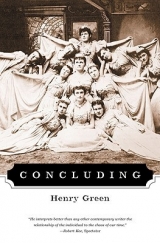
Текст книги "Concluding"
Автор книги: Henry Green
Жанр:
Современная проза
сообщить о нарушении
Текущая страница: 2 (всего у книги 14 страниц)
"A holiday?" he asked out loud because, in that case, there might, at the moment, be less chance of food. Several sang out together in answer.
"Why, this is Founder's Day," they announced. He had forgotten.
"Yes, I expect we spoiled the peace and quiet for you when they stuck us down in this damp den, ten years ago to a week," the cook pronounced.
"Pooled the diet?" he asked, not hearing.
One or two giggles came from the girls as they moved with their trays. But he was well-liked, and respected.
"I shouldn't wonder you thought they'd let you live your life out in peace and quiet," Maggie went on, in a louder voice.
"How's that?" he said, catching it. "Plenty of go about me yet," he bragged.
"Come on, hurry now," Maggie called to the queue. She could not see this because it was beyond the sunlight. "Or I shall never get started," she explained.
"Yes, Mrs Blain," they dutifully answered.
"Heavy on you, too, with your girl sick?" the cook added, condescending.
The old man wondered if she thought Elizabeth was a slavey, but what he jovially said was, "Well, I haven't three hundred of 'em, have I?"
"Oh I don't let those be a bother, my goodness me," the cook replied. "No, all I meant was that a man your age doesn't want to be saddled to fetch and carry for others," she explained.
"I never permit a woman to be a worry," Mr Rock said, with decision.
"I don't suppose," Mrs Blain replied, sparing a glance inside her at the picture she imagined of the late Mrs Rock. "And then your granddaughter will wed and the place'll seem empty," she said, without malice.
"She's not there more often than not," he objected, in the sense that she was always off somewhere to meet Sebastian.
"But then she's not been so well," Maggie Blain agreed to defend Miss Rock, having misunderstood him.
"They overdo things at their age," Mr Rock explained, as though Liz were still a child, with all the time in the world before her for work, love, and marriage.
"Ah, there you are," the cook said.
"I wouldn't have your family, nevertheless," the old man put in. He usually plied the one jest until he won his meal.
"They're good girls," Mrs Blain answered. She was in great ignorance. "Have you got the staff breakfasts up?" she called after the orderlies. At this half promise of food he felt his stomach gush
digestive juices.
"We've taken them, Mrs Blain, and there's one over," Marion insinuated. "Mr Birt's had a night off." Mr Rock waited for the spare to be offered. He waited. Then, to his vague, wondering surprise, beyond the cone of light in which he sat and warmed his cold hollow bones, he gradually felt a tide of female curiosity flow up over him, so strong it was like the smell of a fox that has just slunk by, back of some bushes. He could not understand. If he had only known, this bit of news had been put forward, and some of the girls hung on the answer, to discover whether it was official and above board, the absence of Sebastian Birt under the particular circumstances.
"That's right," Mrs Blain said. "His name's struck off my list," and there was a sort of sigh came from outside the sunlight. The whispering began again. But it had given Mr Rock an uneasiness. Because he was certain Sebastian had been round to the cottage after dark. And now the snake was not even in next morning. Drat Mrs Blain, why couldn't she hurry his breakfast. How right, earlier on, not to carry the tea up to Liz, Mr Rock told himself, the fellow could only have been there all night, and somehow or other these girls knew, which must be one reason they did not propose to give him a bite of anything. He could go hungry now.
"But there's some don't trouble," Mrs Blain said, with so much suggested in her voice that Mr Rock, instantly apprehensive, decided in his own best interests that he would do better to ignore what was on the way, until he knew how grave it was.
"But there's some don't give themselves the trouble," she repeated, directly at him. He realised he would have to respond. He turned to her like a blind man.
"Going off up to London as usual this day of all days," she explained herself.
"Oh, Mrs Blain, it's the date the Commissions sit," said one of the embryo State Servants.
"I tell you I'm right sorry this minute for Miss Marchbanks," the cook continued. "All that goes awry will be laid to her door, and no argument," she ended, in a sort of hush about.
Most of the children were hanging on her words. She was aware, but in ignorance. She sought to improve on this. "God help her, poor woman, if she hasn't the decorations just so in quick time," she said.
The whispers began again.
"Is that the last of breakfast?" she called out, and the old man's heart beat wet in his mouth.
"I should be getting on," he said, to force matters.
"Don't disturb yourself, Mr Rock," the cook told him. "You're one who's never in the light, is he, girls? You'd better get your own now," she gave them leave. And with a sort of chorus of welcome and pleasure because they were hungry too, nine came with their spoons and plates of porridge, and their lovely, sleepy, but rather pimply skins, to sit alongside the famished, sweet old sage. None dared remind Mrs Blain of him. She was a terror for her rights.
"But you are coming tonight, Mrs Blain?" one asked.
"Me?" the cook demanded. "After I've finished the knick knacks for the buffet, which'll take me all day on my stoves?"
"You know you've got the best lot of orderlies on the whole rota to help you," they said.
"I'd never have agreed without," Mrs Blain retorted. "I told Miss Marchbanks. Give me Mary and the girls on her rota, I said, or you'll have a dead woman on your hands."
This statement had a greater effect than she could have expected. There was a sort of gasp round the kitchen, and at least three children, while Mr Rock blindly watched, pushed their porridge plates away. One or two even put what they felt into words.
"I don't think I'll come either, tonight I mean," the youngest said.
"How's that Maisy?" the cook asked. "Are you shy even of a bit of fun at your time of life?"
The girl would not admit it was Mary and Merode she had on her mind, that she feared the worst. But she blushed.
"To cook when the weather's hot turns my stomach," she explained, because Mr Rock's unseeing spectacles were on her. The old man still did not know if he was altogether forsaken, whether, upon this, the dawn of their great day, he was just to get the bare cup of tea.
"Now don't give me that, not at your age," the cook coarsely insinuated.
"Oh Mrs Blain," they all cried out, while Maisy went red.
"Because that's when you can say so," Mrs Blain elaborated with gusto. "Getting your man his Sunday dinner, oh dear, openin' the oven door when you're in that condition, and the hot smell of the roast comes."
"I can smell it now," Mr Rock suggested in great ignorance, and smacked his lips. They all laughed.
"There's expectant fathers' kitchens now," Marion announced, while the old man tried to reconcile himself to the idea that he must go hungry. But the girls tittered, for this that Marion had just put forward was one of Miss Inglefield's more modern jokes in class.
"And I know how my fellow would have said, when he was still alive, if I'd told him that, while my little Enid was on the way," Mrs Blain announced, delighted. "Yet what are you girls thinkin'?" she demanded. "Where's Mr Rock's bit of breakfast, may I ask?"
"Oh Mr Rock," several cried out, got up, and at long last hurried this over.
"It was just. ." Maisy began to excuse herself, with intent to explain how upset she was about Mary and Merode, but the cook would not allow her.
"It was simply you forgot," Mrs Blain interrupted. Mr Rock, who deeply felt his position, begging, as it seemed he had to, for this one meal per diem, next tried not to have it.
"No thank you," he said. "This day I don't fancy. ." and began to get out of his chair.
"Sit you down, don't be awkward," the cook cried. "I can't have my place treated cavalier fashion," she said. "You either eat a good breakfast or you mayn't move out of here in daylight. Then what would your Daisy say without her swill? There's a bit of bran as well, for Ted. You won't have that either if you can't do justice."
"And yourself, Mrs Blain?" he asked, then subsided in his place, mouth watering, glad.
"Me? I mentioned to my girls before you came. I'd rather not refer to that once more," she said with finality. Her stomach was upset. He nodded, old and solemn over the plate, with no idea of what she meant.
He ate.
He was greedy.
They watched in approving silence.
"I can't imagine what you'll think, Mr Rock, to forget you like we did," a girl lied, to cover her tracks.
"I don't," he replied, rather abrupt, but his feelings, at the moment, were directed to his stomach. Some of them feared he had been offended.
So they began to make up to him. They uttered little comforting remarks. He sat silent. With an old man's gluttony he had eaten too fast and he was, one might say, listening to the food settle in a cavernous, wrinkled belly.
"We all feel the same when we're on orderly duties, Mr Rock. We'd really miss you if you didn't drop in of a morning."
"I think Daisy's sweet," Margot said.
"Will you ask me for a dance, Mr Rock?"
"They only played waltzes, too, when you were young, Mr Rock, didn't they?"
"I think they might let us have something else besides," one of them put forward.
"Like a tango," she said. "They still have those in the smaller halls."
"Enough's enough," the sage announced. Several of the girls began to giggle. They were not to know this, but he was referring to his digestion.
"I think it a shame," Mrs Blain brought out, in a warning voice. But the younger ones could not stop, behind hands they had over their mouths.
"I don't know what's so comical, I'm sure," Mrs Blain said in reproof, and then the old man realised from their flushed faces that they were laughing at him.
"I shouldn't pay attention," Mr Rock commented.
"Oh we don't," they answered, still giggling.
"To me," he said. They stopped. "I'm only on sufferance here, you know," he said, with a satisfied bitterness.
"Oh Mr Rock," they cried.
"I think it a shame," Mrs Blain announced, brightly. "Now then," she called out. "Let’s get goin'." And in a moment the old and famous man was left alone at table, altogether blinded by increasing brightness, before an empty plate and a cup that was warm, behind a rumbling stomach, left to dread the journey back with full buckets.
When Sebastian Birt came into the staff breakfast parlour he found he was first. He did not look out on the bright daylight but under the dish cover on a hot plate. He took no scrambled egg.
He poured himself a cup of tea. He was sitting down to this when Miss Winstanley entered. He did not rise. He said to her, in what he imagined to be the manner of a State executive, for he was always in a part, "Well, well," he said, rubbed hands together.
"Morning, Sebastian," she said. "It'll be a lovely day."
"So it is, so it is."
"But I thought you'd got off for the night," she went on, and helped herself at the side table, paying attention to how he acted.
"Couldn't fit it in, unexpectedly detained, these trade delegations from the North," he answered, to keep up the pretence. But he did not look away from his cup. As he was fat, and very short, he seemed a small boy. It was not at this that Miss Winstanley tenderly laughed.
"And is the guv'nor to let you come to the dance tonight?"
"There are, or rather were, two governors," he replied, this time, all at once, in the part of the sort of lecturer he was not. "The Governor of the Bank of England, abolished as such long since, then the governor of the local poor law institution, or poor house, known to each one of you, if not from personal experience, then at least by report, and a factor in our civilization that we have yet to eradicate." He raised his voice in mockery while he watched his cup. "To pull out by the roots," he ended.
"Edge?" Miss Winstanley prompted.
"The functions are so similar," he replied. "They may readily be confused. The best mind can fail to distinguish between Edge and the common or garden workmaster. Where similar functions are operated in dissimilar environments which may yet have factors common to both. ." and here he paused, at a loss perhaps. This gave her time to put over, "I know all that, but are you coming?"
"I should really see my secretary, let me just glance at my book," he replied, in the character of an executive once more. "I cannot be rushed willy nilly into appointments." A silence fell. Then she thought of something.
"Look here," she said, "you put yourself down as not to want breakfast."
"Tchk, tchk," he answered, still the State manager. "What has my girl been about?" For the first time he looked slyly at Miss Winstanley. But she reached for the butter, and did not notice. When he went on, as he did at once, it was with lowered eyes once more.
"They will allow themselves to be pressed. Not in a trouser press, ha, ha, I should hope not indeed. But they will lose their pretty heads over the telephone. When calls really begin coming in, they won't simply lay the receivers down off the hooks to have time to think, they will persist with answers till they get more and more flurried. Then the harm's done, the mistake is made, and I'm landed for an engagement I can't possibly. ."
"But there isn't a breakfast for you, Sebastian," she interrupted.
"I shall decline to take one of theirs, even if pressed," he answered, perhaps in reference to his colleagues who, this holiday morn, must be enjoying a long lie abed. "I know better than to get the wrong side of Mrs Blain," he explained, rather more soberly. Then he went on, back in the part once more.
"I always say, as a matter of fact I insist in the office, that we are all members of a team, helping others to help themselves."
"It's all very well, but there'll be a cup and saucer short, Sebastian."
"Well I can wash mine, can't I?" he demanded, falsetto now. "And my lipstick's lovely. It never comes off."
"You'd better," she said. "I don't use any, as you could tell if you looked."
At this moment, when Sebastian might not have known how to reply, for he was a shy fellow, Dakers, the law tutor, came in.
"Morning all," the man said.
"Hullo Sebastian. I thought we were not to have the honour this forenoon. D'you know I almost fancy it may eventually turn out to be rather a fine day."
"It's like this, Dakers," Winstanley said. "The lad here was detained. Calls on his time have been heavy of late," she explained, with malice. Mr Birt pettishly frowned into his cup at this open allusion to the hours he spent with Elizabeth.
"The guv'nor consulted me last night," Dakers said. He had not missed the implications in Winstanley's last remark. He had a particular sort of loyalty towards the young woman. He wished to warn them both.
"Edge? Consulted you? What on earth about?" Winstanley asked.
"Oh, she wanted me to run through the original Directive from the Ministry, which relates to the cottage held by our fabulous pensioner, Rock," Mr Dakers explained. Seated up to the table, he was now engaged in rather nervously rearranging the knives and forks on each side of a porridge plate.
"And which shelters his granddaughter Elizabeth," Mr Birt added, still with his highest falsetto, but which had an edge to it, a squeal of unease.
"The unremunerated opinion of a lawyer is not worth a rap," Dakers assured them, raising the spoon at last. "But I had to tell her, and, since no-one else is here, I'll pass it on." Then he broke off to put some porridge in his mouth. "I don't think we have a leg to stand on. It's his for life," he said.
"How Machiavellian," Birt exclaimed shrilly. "You mean he can defy each and every one, the guv'nor included? Well, everything's perfect then, isn't it?"
"What I mean, and why I chose this moment, is that she'll cast about her to find some other way out, my dear fellow."
A grey line of milk escaped from a corner of his mouth. He dabbed at it, as though he had cut himself shaving.
They prudently joined together to change the topic, did not refer to it again.
When Mr Rock got back to his cottage from the house he was tired and out of breath, because the swill buckets had been particularly heavy this fine morning. He noticed the postman had called and bent down with a groan to pick some envelopes off the mat. He always paid his small bills in cash with the result that his correspondence, which came to about half a dozen letters every day, was made up of complimentary resolutions passed by various scientific societies, letters from students, or maniacs and so on; at least that is what Mr Rock believed, because, for some years now, this distinguished man had not opened a single one of the communications he received. Instead he always put them unexamined into a travelling trunk which was on the floor just inside the living room, and which he used for nothing else. He sat down on it today, looked at each envelope back and front because he expected to hear the result of the election. But there was no trace of an O.M.S. (On Majesty's Service; they had left out the His, long since, as being unworthy of the times). On the other hand there was a private letter which might be from young Hargreaves. But then, Mr Rock asked himself, what point could there be in finding out, it would not advantage him in what he termed his battle for the place, the roof here; and wouldn't it rather weaken his resolve if he knew which way the election went? After all, his attitude was sound. More than that, it was straightforward, which could not be said of the cruel posturing taken up by those two Babylonian harlots, Baker and Edge up there, who schemed day and night, never actually to come out in the open because they knew very well they would never venture, but who, with a tireless industry, neglected their trivial duties to machinate against him, to play with his girl's reason even, and who fell so low as to work on her sentiments with truly Byzantine malice by the use of a tutor they had no wish to retain, or other pretext to expel, the lout.
No, it would be folly on his part to break the rule of years, to open his correspondence just to satisfy a moment's panic. What he had done for the country was his monument, no-one could steal that, even if they voted him tomorrow into the hunt kennels for broken down scientists. Because he wasn't going on a chain. Because he'd take the money instead, or refuse it. Besides he injured no-one in the blameless life he led here. And an individual still had some rights under the State. And if he opened this letter now, learned whether or no he had been elected, he could tell the turn their conversation would take when he met Miss Edge at the dance tonight. By the way, was he going?
Well, Mr Rock, she'd say, and am I to congratulate you, or some such phrase, the smarming harpy, after which, if he knew he had been elected, he would have to smirk thank you, yes, they've put me in, I'm delivered over to their charity now all right. Or, on the other hand, if they had not elected him, was he to eat humble pie, tell her that young men whose work he despised had not thought him worth the candle, after all he'd done. Never, he told himself, never, he'd take the money, and then found he was actually opening the letter he had assumed to be from young Hargreaves, and which wasn't from the man after all.
"Dear Sir," it read.
"Although I have not the honour of your acquaintance, yet due to the pride of place which science occupies in the State, thereby she can work for the good of all, I write to enquire. ." and the old man, who was breathing easier for his rest, thrust the thing back into its envelope, got off the trunk, opened this, and put the day's post onto a mass of other unopened letters. Muttering, he stumped off to his outhouse to boil the swill. He found he had no paper with which to light a fire, came back, raised the lid, took a fistful of letters at random, and used these. He employed the daily newspaper, which he never read, only in the outside lavatory.
The fire was lit when he half heard a remark behind. He turned round, saw his granddaughter, Liz. She was a distracted looking woman and wore his winter overcoat over red cotton pyjamas, with rubber boots.
"Morning Gapa," she said, as always to him, in an exaggeratedly loud voice, "I think, you know, it's going to be a lovely day."
"There you are, dear," he replied, and his sour old face cracked into a grave smile. "Did you sleep all right?"
"Took me rather a long time to sink off and then it was so tiresome, you know how things are, I awoke, I don't know what time it was, oh about four in the morning, and couldn't drop off again."
"Hadn't you better go back to bed then, dear," he said. "I would if I were you. And I'll bring you up a bite, directly I've done Daisy's swill."
"Oh but I had to come down at once, soon as ever I heard the postman, I mean I'm so excited for you, Gapa dear, today of all days this must mean such a great deal. ." and, as so often, her mind fell away in a wail while she looked at him out of big empty eyes.
"Now what are you getting at?" he enquired, like she were a child. His tone was good-humoured, although he knew very well what she had tried to express.
"Well, it's the dawn of the day after, isn't it?" she said. "When they had their meeting? I thought, that's to say I expected, well, I do think Mr Hargreaves might have written, just to tell, I mean. I'm so keen about this for you, there, of course."
"Why, so it is, I hadn't given a thought," he lied, and turned his back to stir what was in the pot.
"You mean to say you've put your letters away like you always do, this morning out of all, because it's important, you see, they might have had to write specially and you ought to answer. Oh Gapa," she ended. "Don't you understand?"
"Liz dear," he said, "there's little enough to upset anyone. They know me better than to write. And whatever the thing is won't make any difference. I've told you. Surely you remember?"
"You stand there and say that after all I poured out to you last night, what you want to tell me is that not a word, I mean absolutely water off a pig's back, no difference at all, that you didn't even listen yesterday? Oh, you can be stubborn."
"Now Liz," he said. Tears came into his eyes, but she could not see because he stood averted.
"Look," the woman said, and meant it so much that she actually managed a connected sentence. "Would you allow me to get this morning's post out of your box?"
"You'd not find much, dear," he said. "I used them to light the fire."
"That's that, then," she said, not displeased. She liked decisions postponed.
"I should run along, dear, and have your rest out," he said, disappointed.
Liz did not move.
"About tonight," she said. If he had watched, he would have seen an expression of satisfied guile pass across her face. "What are you, I mean, had you thought, will you go?"
"In the circumstances, yes, I think we'd better."
"What circumstances?" she asked sharply, for it would be too absurd if he imagined he must chaperon her with Sebastian.
"Why nothing," he said. "Only they might be curious, just now, if we did not put in an appearance. Though I'm too old for that sort of idiot jollification," he said.
"Oh, Gapa I am glad, that's splendid, because I was so keen, you see I'm so proud, proud to… you know, and I was afraid. ."
"We're only on sufferance here, you understand," he pointed out, glad to ignore her genuine enthusiasm. He was aware of her desire to show him off, and, if he had remembered this in time, it might easily have prevented him coming to the dance.
"Dear Gapa," she said. "If you could only understand, I do so wish you'd realise why there's no-one, there couldn't be, and here of all places, why they'd never dare, what, after all you've done, oh it's too absurd?"
He did not reply.
"Did you see Sebastian already?" she asked.
"No. He had the night off," he replied, as though to keep up a polite fiction.
"He didn't," Liz said. It was noticeable when she spoke of this young man, and even more so when in his presence, that she was fairly collected in her talk. "He slept over there, after all. He thought it would look strange to be away, you see, well not there, the day of the dance."
Mr Rock's jealousy and disbelief choked him before he could answer.
"He said he'd come over early," she explained.
"You get back into the house, then," he told Liz, all the more certain she had only come out to leave the way free for Master Birt to get off. "I'll see if I can't fetch you breakfast presently."
"But how about, I mean you've been up all this time, have you had some, oh, now Gapa, you can really try one so, what about you?"
"I'm all right. It's never hurt me to do without," he said, his self pity allowing him to forget what Mrs Blain had provided. "But you've been ill," he generously added, and felt tired.
"Hullo," she then exclaimed, in such a well known accent of pure gaiety that Mr Rock knew, before he could turn round. It was Sebastian Birt, in a neat brown suit.
"Hullo Sebastian," he said.
"And the light of their camp fires went out to meet the dawn," this young man announced, pretending to quote Herodotus, in a reference to the fire under the copper in which Daisy's swill was being cooked.
"You're up then," Mr Rock said, looked shortsightedly to see whether Sebastian was shaved and, when he found that the young man had done so, having to admit to himself, with a gloating reluctance, that the prating idler could not have spent the night in her bed unless, as was just possible, he had been slippy enough to bring his razor or depilatory with him. The worthless fellow would have had to do it on cold water though, which was very unusual in such a quarter, Mr Rock thought.
Meanwhile Elizabeth Rock, who had realised how unattractive she must look in her state of undress, was off back to the cottage.
"Wait for me, now," she called, "I won't be a moment, really." And Sebastian, who did not answer, just stood there in a daze at the chance which bound him to these two strange people by the love he had for the granddaughter, the love, he thought, of his life.
"Well?" Mr Rock enquired, not for lack of more he might have said. Sebastian brought himself out of himself with a jerk.
"They've mislaid one of their girls," he mentioned as casual as could be, speaking in his own voice, as he almost always did to the old man.
"Who have?"
"Miss Edge and Mistress Baker," Sebastian replied, about to break into eighteenth-century speech, but he checked himself. "In fact they're looking everywhere for a couple, a brace," he added.
"Bless my soul," Mr Rock commented, his eye on the swill. The news did not at once disturb him.
"And they've left Ma Marchbanks to hold the baby."
"How's that?"
"They've gone up to Town as per usual. Our misguided rulers have put both on separate Commissions which sit Wednesdays. Of course, they can't miss those."
"Good," Mr Rock said.
Sebastian barked a laugh. "What in general is good about it, sir?" he asked. "There's hell to pay up at the house."
"I always feel easier when those two State parrots are safe off the premises," Mr Rock said. "I don't know what they put in the food now, but these last few weeks I can't seem able to boil your swill."
"Preservative," Sebastian promptly replied. "For what we are about to receive may it be ever fresh," he misquoted in his falsetto, then immediately controlled himself. "Tell me, does she do well
on it, sir?" he enquired with deference, as though Mr Rock might suppose the question to be sarcastic.
"So long as I'm allowed to keep the animal," Mr Rock nervously answered, "and I think I've a reasonable prospect. But if I were a younger man there's one thing I'd do." And he looked with savagery at Birt. He was in earnest. "I'd have a shot at this filth of a swine fever," he said. "Next to the system we live under each one of us nowadays, it's the curse of our time," he ended, stirring the swill once more.
There was a silence.
"You haven't seen Merode and Mary, then?" the younger man asked. He was anxious again.
"Me? No. Why should I?"
"They're the pair of students we can't find."
"So you said," Mr Rock admitted, horrified.
There was another silence.
"It's going to be a magnificent day," Sebastian suggested.
"When you get to my age you'll appreciate it."
"You mean the weather?" Sebastian asked, respectfully.
"Did you say 'end of her tether,'" Mr Rock demanded in a wild voice, thinking of Mary and turned to face the younger man who explained, "I spoke indistinctly again. No, I mentioned the weather."
"Oh I see," Mr Rock commented. "It's my ears," he said.
At this moment the swill began to boil with mustard bursting bubbles and, as a result, a stench rose from the copper harsh enough to turn the proudest stomach. Birt would have gone off at once but did not like to leave at a moment of awkwardness and incomprehension. Because, also, of his love for Elizabeth, he did not wish to antagonise the old man, so put up with the smell. Besides, he had promised to wait.
"At last," Mr Rock said, and came to Sebastian's rescue by moving away on his own. "Have you had breakfast?"
"Oh yes, thanks all the same, I had mine up at the Institute," Birt lied, so as not to saddle the sage with the need to prepare an extra portion. For his part Mr Rock showed no sign of what he felt as, with simplicity, he waited by the kitchen entrance for Sebastian to pass first. Even in this room Sebastian imagined he could taste the stink of swill. But just then Elizabeth entered, and the young man forgot in anxiously watching to find how she might be. Much could, as a rule, be told from the clothes she wore, from her manner when she set out.
"What's it to be?" Mr Rock asked, as he took a saucepan off a nail.
"Why Gapa," she said, eyes smiling upon Sebastian. "How sweet you are to us, but you mustn't bother, not on a day like this. I couldn't now," she said.








